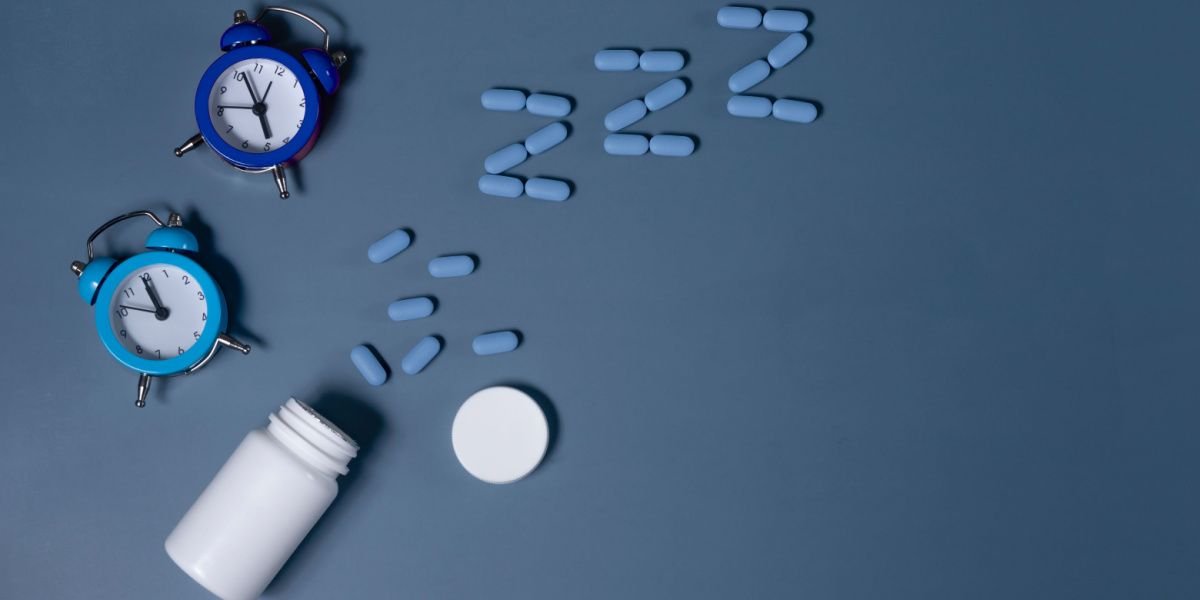Trazodone is an antidepressant medication that is often prescribed off-label to treat sleep disorders such as insomnia. It can be effective at helping to improve the quality and quantity of sleep. Side effects can occur and it is advised to consult with your doctor about any pre-existing physical and mental health conditions before taking trazodone.
- Trazodone is often prescribed at a daily dose of 25-150 mg to treat sleep disorders.
- Trazodone can begin working within an hour and significant sleep improvements can be seen within a week.
- Trazodone can cause unpleasant side effects, including cognitive impairments. It can also cause daytime drowsiness, which may increase the risk of accidents.

Is it safe to take trazodone for sleep?
It is safe to take trazodone for short-term treatment of sleep disturbances. It is regularly prescribed for this purpose with good effect and several trials and reviews have reported positive outcomes. [1][2]
Trazodone is not approved by the Food & Drug Administration (FDA) for treating insomnia as the evidence of its safety and effectiveness is limited. It was originally approved for depression and mood disorder treatment but has fallen into obscurity in favor of more effective treatments. In more recent years, trazodone has resurfaced and is increasingly being prescribed as a first-line medication for sleep disorders, with various guidelines and clinicians recommending its use. [1][3]
Side effects can occur which may vary from person to person. Those who do not tolerate the medication well might experience cognitive and motor impairments and might prefer alternative medications. Trazodone may cause daytime drowsiness, so it is recommended to avoid driving before knowing how the medication affects you. [4][5]
Trazodone for sleep dosage
Trazodone is effective at treating sleep conditions such as insomnia and can improve the quality and quantity of sleep when prescribed at a dose between 25-150 mg. This dose is taken at night, shortly before bedtime. [2]
Primary insomnia may require a nightly dosage of 150mg. Trazodone can also treat secondary insomnia, caused by physical or mental health conditions or medications. [1][6]
For example, many people who take selective serotonin reuptake inhibitors (SSRIs), a type of antidepressant, develop sleep disturbances as a side effect of the medication. Trazodone is also an antidepressant medication but works in lower doses to reduce sleep-related side effects of SSRIs. Several studies indicate that a nightly dose of 100mg is effective for secondary insomnia. [7]
Individuals are likely to be started with a lower dose, which can be increased to find the most effective dose. A gradual increase can help reduce potential side effects. Similarly, when stopping the medication, it might be necessary to gradually reduce the dosage, to prevent withdrawal symptoms. [5]
Maximum dosage of trazodone for sleep
Studies of trazodone use for sleep disorders and insomnia have shown that an effective dose is between 25-150 mg per day, suggesting that a maximum dose of 150 mg is efficient. In rare cases, some individuals may be prescribed up to 300 mg. [1]
When used to treat depression, the recommended daily maximum of trazodone is 400 mg in divided doses. However, the dose required for sleep conditions is much lower and is taken in one dose rather than split throughout the day. [5][6]
Maximum dosage for sleep in elderly
Trazodone is also used to treat sleep disturbances occurring within the context of dementia in older adults. Within this group, lower doses may be sufficient. Studies suggest that a nightly dose of 50 mg is effective. [8]
Caution for taking trazodone for sleep
Trazodone doses for treating sleep conditions are lower than those prescribed for treating depression. As such, adverse effects are less likely, although some individuals should use trazodone with caution and discuss any pre-existing conditions with their prescribing doctor before use.
If you have any of the following conditions, trazodone may not be recommended, or lower doses and increased monitoring may be required: [5]
- History of suicidal ideation
- History of bipolar disorder or manic symptoms
- Heart conditions
- Liver or kidney problems
It is also advised to consult with your doctor before taking trazodone if you: [5]
- Are pregnant or breastfeeding
- Are taking blood-thinning medications
- Are currently or have recently taken an antidepressant, particularly a monoamine oxidase inhibitor (MAOI)
Possible side effects of trazodone
Trazodone can cause side effects, particularly in the first few weeks of treatment. Common side effects include: [3][5]
- Drowsiness
- Upset stomach
- Dry mouth
- Changes in appetite
- Dizziness
Serious side effects of trazodone include: [3][5]
- Trouble breathing
- Fever
- Severe confusion or cognitive impairments
- Seizures
- Unusual bleeding or bruising
- Painful, long-lasting erections
- Persistent vomiting or diarrhea
Side effects that continue for several weeks, become worse, or are problematic and concerning should be reported to the prescribing doctor. It may be necessary to change your medication and you may require medical treatment.
Trazodone overdose
It is possible to overdose on trazodone, particularly when intentionally or accidentally taking a higher dose than prescribed.
Symptoms of a trazodone overdose include: [5]
- Extreme changes in heart rate
- Heart failure
- Drowsiness
- Vomiting
- Seizure
- Trouble breathing
In the event of an overdose, contact a medical professional immediately or call 911 in an emergency.
Trazodone vs. sleeping aid alternatives
Despite currently not being approved by the FDA for use in treating sleep conditions, trazodone is considered an effective and safe medication for this purpose. It is often well tolerated and can be safer for use than other sleeping medications. [1][6]
Commonly prescribed medications for sleep conditions include: [9]
- Benzodiazepines, such as temazepam (Restoril) and diazepam
- ‘Z’ drugs, such as zolpidem and zopiclone
- Antidepressants, such as amitriptyline and mirtazapine
- Melatonin
Benzodiazepines and Z drugs are very effective at improving sleep disorders. However, they may be more likely than trazodone to cause daytime sedation. They are also highly addictive and can quickly lead to dependence so are recommended for short-term use only. Trazodone has a low risk for abuse and dependence. [9]
Antidepressants like mirtazapine can be effective at managing sleep disturbances and may be comparable with trazodone in terms of effect and tolerability. [10]
Melatonin is a naturally occurring hormone in the body that helps regulate the sleep-wake cycle. Using melatonin supplements can help improve sleep disorders and is unlikely to cause adverse effects. Compared to trazodone, it may be equally effective at managing sleep disturbances. [11]
FAQs
Is it okay to take trazodone every night for sleep?
For short-term use, it is advised to take trazodone every night to treat sleep disturbances. It should be taken exactly as prescribed by the doctor.
When do you take trazodone for sleep?
Typically, when taking trazodone for sleep disorders, one dose is prescribed per day, which is taken at night, around 30 minutes before bedtime.
How long does it take for trazodone to kick in for sleep?
Trazodone can begin working within 30-60 minutes to help with sleep.
Can you use trazodone long-term for sleep?
It is recommended that trazodone be used short-term to manage sleep disturbances. There is limited evidence about its long-term use. Ongoing sleep issues should be reported to a clinician and managed with a comprehensive treatment plan involving psychological and pharmacological interventions.



-guide-detail.jpg?v=1756808550)
